On December 5, the Permanent Missions of Japan and Poland to the United Nations, in cooperation with the Henry L. Stimson Center, held a half-day seminar on sanctions, nonproliferation and disarmament.
This event was organized as the previous conference held in 31 May, 2011 received positive feedback from many participants, including UN diplomats. The Japanese mission found it of use to provide many other mission experts with the opportunity to engage in candid discussions as well as to exchange information on issues surrounding non-proliferation. While the previous event allowed for comprehensive discussion of sanctions, disarmament and nonproliferation, the goal of this conference was to provide experts with the opportunity for in-depth discussion.
About 120 participants including more than 50 Member States and experts from relevant fields engaged actively in the discussion. The participants also included staff from the UN Department of Political Affairs and Office for Disarmament Affairs, the experts from relevant Security Council Committees such as the 1540 Committee (on non-proliferations on weapons of mass destruction), the 1718 Committee on North Korea, the 1737 Committee on Iran, and the 1973 Committee on Libya, and scholars and members of think-tanks (The conference agenda can be found here).
Following the opening remarks by Ambassador Tsuneo Nishida and Ambassador Sobków from Poland, experts from the Committees on North Korea, Iran and Libya and discussants shared their views on the regional affairs surrounding the three countries. This first session covered trends and characteristics of UN sanctions violations by North Korea and Iran and the challenges Member States face in implementing the related Security Council Resolutions. Many participants pointed out that it is essential for the Committee to share information regarding its work outside the Security Council in order for Member States to fulfill their obligations under the relevant resolutions. This information includes investigations conducted by the Panel of Experts, recommendations of the Panel as well as lessons learned from violation cases.
The panel of the second session consisted of the Coordinator of the 1540 Committee Expert Group, experts on regional non-proliferation issues and an industry representative. This session dealt mainly with regional corporations and efforts made by the private sector on the non-proliferation of weapons of mass destruction (WMD). The coordinator of the 1540 Committee as well as the experts on regional non-proliferation issues in Central Asia, Central America, and Southeast Asia articulated the challenges of balancing the key interests of promoting trade and maintaining national security through preventing the spread of goods and technologies used for WMD. They emphasized the importance of remaining vigilant in the relevant regions and supporting countries with limited capacity. The discussion continued on how to deal with WMD, especially in developing countries, where the issue of WMD is not as high a priority as that of arms and drug trafficking or transnational organized crime. Some pointed out that it is effective to encourage concerned states to cooperate through mechanisms such as the Proliferation Security Initiative (PSI). Furthermore, an expert from a financial service explained that in the era of globalized financial markets, every transaction is monitored closely by financial institutions to verify that it was not made in contravention with relevant UN resolutions. The expert also pointed out that the efforts made by Member States to comply with these UN resolutions are considered by potential investors as key criteria for deciding where they would place their funds.
The keynote speaker, Mr. Masao Takebayashi, General Manager of Hitachi’s Corporate Export Regulation Department, explained the Japanese corporation’s comprehensive work on export control. Mr. Takebayashi’s presentation focused on the actual practice of export control applied by one of Japan’s leading global corporations, Hitachi, Ltd. He provided specific examples of how company’s inspection process and export activities operate in compliance with related Security Council resolutions and domestic laws. Mr. Takebayashi also showed some examples of how the company adjusts their operations when a new law on export control is adopted in a country in which they operate. Many participants spoke highly of Japanese companies’ state-of-the-art compliance mechanisms and expressed their desire for these efforts to be replicated by other nations’ corporations as well as small and medium size businesses. Another audience member asked how the top management makes decisions when they face possible loss of business opportunities due to the implementation of Security Council resolutions (The presentation of the keynote address can be found here P.1-22 , P.23-41).
Due to high interest in recent issues on Iran and Libya in addition to North Korea, many representatives from the diplomatic missions participated and engaged in lively discussion. The fact that it was the first visit of the Libya Sanctions Committee’s Panel of Experts to visit New York after the establishment of the Committee this May also drew the interests of many participants. The large turnout of participants from the wide-ranging membership of the UN could also be attributed to the fact that the meeting was organized not only by Japan but in cooperation with Poland, another Member State active in tackling the issue of regional disarmament and nonproliferation. (Poland is a member of the Non-Proliferation and Disarmament Initiative, a ministerial meeting led by Japan and Austria.) In addition to the exchange of views by diplomats from Member States, the participation of representatives of the UN Secretariat, Expert Panels, scholars, and the private sector made the conference more meaningful, as these contributors presented perspectives based on their knowledge and experience in the field.
With the participation of panel experts and regional specialists, the meeting was able to cover specific cases of sanctions violations and recent trends of sanctions evasions in North Korea and Iran, two countries whose nuclear programs are of particular concern to Japan. They also addressed the difficulties pertaining to the effective implementation of Security Council resolutions. This event was valuable as it allowed non-Security Council Member States to gain a deeper understanding of the challenges in dealing with North Korea and other nations and encouraged them to actively engage with these issues. Moreover, the participation of corporate representatives and their detailed explanations of their overseas trade, technology transfer as well as international financial matters allowed participants to gain a clearer picture of the situation on the ground and the challenges associated with implementing Security Council resolutions. Many diplomats and UN officials who do not typically have the opportunity to speak with representatives of the private sector commented that it was very useful to be given such an opportunity.
At the end of the seminar, Ambassador Nishida delivered the closing remarks. He thanked the attendees for their active participation and announced that Japan will continue to play an active role in the field of disarmament and nonproliferation by continuing to host similar conferences in New York, which enjoys the most universal membership of the international community. Ambassador Nishida expressed his intention to providing other Member States with future opportunities to discuss the critical issue of international non-proliferation and disarmament.
Note: Please find the summary of the event made by the Stimson Center here. |
 |
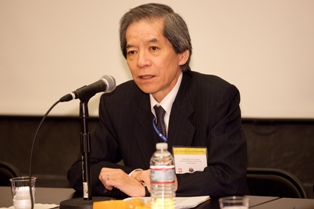
Opening remarks by Ambassador Nishida
|
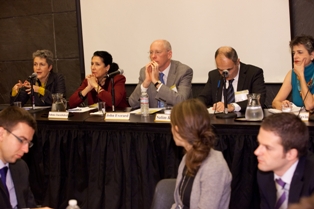
Members of the Panel of Experts of Sanctions Committees at the First Session
|
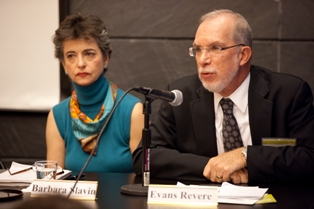
Mr. Evans Revere commenting at the First Session
|
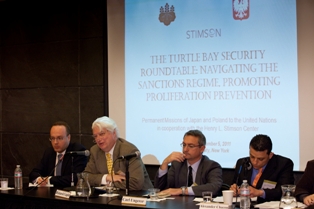
Participants of the Second Session discussing the challenges of WMD
non-proliferation
|
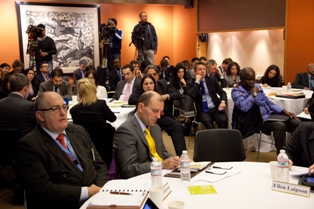
Participants of the Conference
|
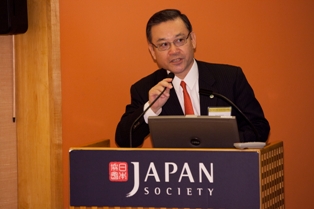
Mr. Masao Takebayashi delivering his keynote address
|
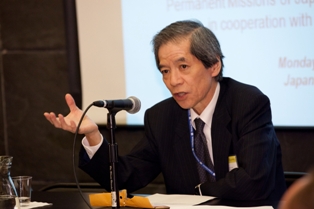
Concluding remarks by Ambassador Nishida at the Closing Session
|
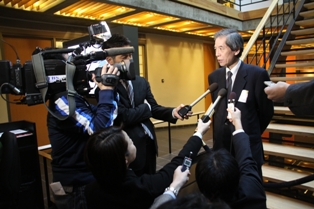
Ambassador Nishida responding to the press
|
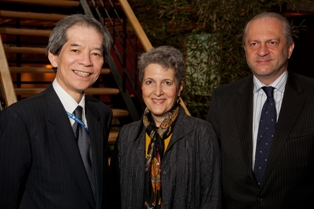
Principals of the event: Ambassador Nishida, Ms. Laipson, President of the Stimson Center, and Ambassador Sobków of Poland |
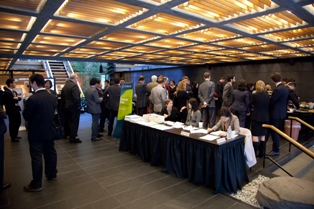
Participants of the Conference
Pictures were provided by Mark McQueen (with the exception of the eighth from the top)
|
|

